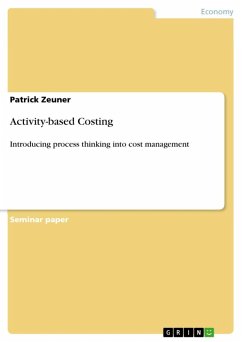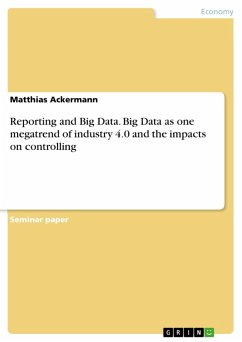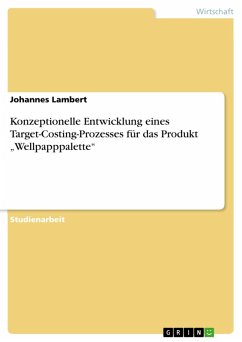Seminar paper from the year 2007 in the subject Business economics - Controlling, grade: 1,3, University of Applied Sciences Wildau (WIT Wildau), course: Managerial Accounting, language: English, abstract: Activity-based costing first gained publicity in the early 1980s. It was developed as a logical alternative to traditional cost management systems that tended to produce insufficient results when it came to allocating costs. Harvard Business School Professor Robert S. Kaplan was an early advocate of the ABC system. Due to a changing business world and strong competition, the cost structure in many companies changed, while facing an increased price pressure. When profit margins are decreasing, companies are focusing not only on external but also internal opportunities to improve their cost structures and to make hidden costs transparent. This lead to the introduction of Activity-based costing (ABC) as a new approach of process thinking to make the internal organization more flexible to react to changes in the production process and allocation of costs as well as to deal with overcapacities. This paper will focus on the ABC tool, which is aiming at transparency, efficiency increase and improvement of the given cost calculation systems. The ABC method enables management to optimize the enterprise with detailed information for a thorough decision making process. ABC is a method for developing cost estimates, based on the activities used within the production process per cost object. To develop a cost estimate the most important activities within the production cycle - the cost drivers - need to be identified. The activity must be definable and measured in units, e.g. number of man hours. After all activities for producing the product are known, a cost estimate is prepared for each activity. These individual cost estimates contain all labour, materials and equipment costs, including overhead, for each activity. Each complete individual estimate is added to the others to obtain an overall estimate. To gain sufficient cost estimates, data must be collected and verified to make ABC a functional and precise tool. This chapter leads through the necessary steps to implement the ABC approach and its methodology.
Dieser Download kann aus rechtlichen Gründen nur mit Rechnungsadresse in A, B, BG, CY, CZ, D, DK, EW, E, FIN, F, GR, HR, H, IRL, I, LT, L, LR, M, NL, PL, P, R, S, SLO, SK ausgeliefert werden.









